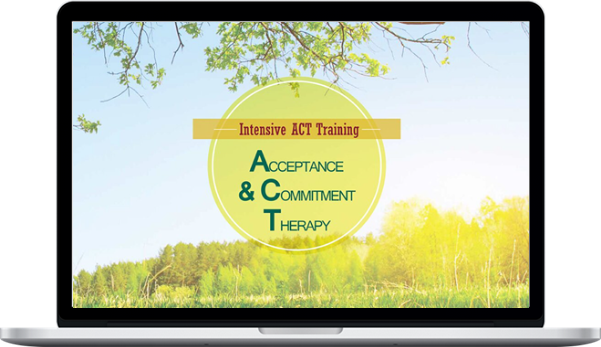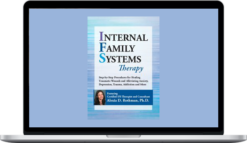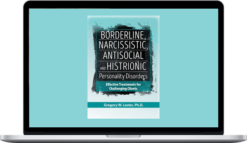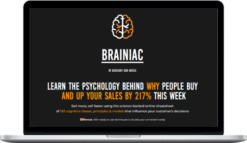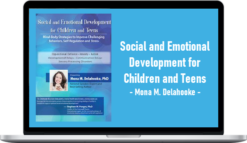Daniel J. Moran – Acceptance and Commitment Therapy: 2-Day Intensive ACT Training
$149.99 $77.00
»Instant Delivery
Description
Daniel J. Moran – Acceptance and Commitment Therapy: 2-Day Intensive ACT Training
Description of Acceptance and Commitment Therapy
Looking to improve your therapy approach?
How often do you review your appointment calendar and start wondering how you’re going to, finally, help a regular client who seems to progress for a while – and then regress?
Each time he/she arrives, you use the same tools and techniques you’ve used for so long – and mostly successfully – but this one client is testing your skills. Now you can begin to integrate Acceptance and Commitment Therapy (ACT) into your practice – and see improved outcomes.
Researched and developed by world-renowned researcher, speaker and author Steven Hayes, PhD, Acceptance and Commitment Therapy is fast becoming the treatment approach that gets to the heart of therapeutic relationship.
Watch ACT expert, trainer and co-author with Steven Hayes of ACT in Practice, Daniel J. Moran, Ph.D., BCBA-D, for Acceptance and Commitment Therapy workshop where you will develop highly practical, evidence-based skills, case conceptualization techniques and powerful strategies that will improve outcomes for the following:
- Anxiety Issues
- Post-Traumatic Stress Disorder
- Mood Disorders
- Substance Abuse
- Anger Management
- Eating Disorders
- Trauma
- Personality Disorders
Complete this intensive, engaging and transformative workshop and start a new path for healing you can use with your most difficult clients.
What You’ll Learn In Acceptance and Commitment Therapy
- Demonstrate effective use of the six core processes of Acceptance and Commitment Therapy (ACT) to help clients advance psychological flexibility.
- Employ clinical techniques for increasing psychological flexibility in clients using ACT.
- Utilize acceptance approaches with avoidance problems to strengthen a client’s willingness to have emotions.
- Apply clinical skills to help client effectively handle automatic cognitions.
- Utilize effective ACT exercises in therapy to aid clients with developing new skills to engage in the present moment and move past struggles.
- Assess and clarify a client’s values in order to develop an effective treatment plan and avoid potential clinical problems.
- Integrate ACT into different therapeutic styles and methods as an approach to managing symptoms.
- Create committed action plans for clients with anxiety disorders to improve level of functioning.
- Use metaphors to undermine language-based avoidance repertoires to improve client engagement.
- Utilize clinical strategies to develop an ACT-based behavior therapy plan as it relates to treatment outcomes.
- Perform emotional, behavioral willingness and exposure techniques with clients to reduce experiential avoidance.
- Apply ACT techniques to the treatment of specific disorders including depression, anxiety, trauma and personality disorders.
Acceptance and Commitment Therapy Outline
The ACT Model
- The nature of human suffering
- ”Healthy normality” is a myth
- Language: The double-edged sword
- Undermine unhelpful thoughts
- Aiming for psychological flexibility and why
- The ACT hexagon model
Limitations of the Research and Potential Risks
- Children and adolescents
- Acute, florid hallucinations
- Catatonic depression
- Individuals with an adverse reaction to mindfulness exercises
Acceptance
- Strengthening a willingness to have emotions
- The opposite of acceptance is experiential avoidance
- Experiential avoidance throughout the lifespan
- Why acceptance is important
- Case example: Teenage shyness & hoarding
Defusion
- Look at thoughts rather than from thoughts
- Deal with automatic thoughts
- The power of words
- The problem with cognitive fusion
- Address CBT-based disputation techniques with defusion
- ”Taking your mind for a walk” exercise
- Case example: Eating disorders & social phobia
Perspective-Taking
- Understand the “Self” in ACT
- Self-as-content, self-as-perspective, self-as-context
- Observer self-exercise
- Deal with identity issues
- Case examples related to PTSD & childhood sexual trauma
Mindfulness
- Contacting the present moment
- Why being in the here-and-now is critical for mental health
- Relationship between mindlessness and psychopathology
- Meditation, mindfulness and mindful action
- Exercises for mindful action
- Case example: Anger, personality disorders, alcoholism
Values Work
- The positive side of language
- Identifying core values
- Differentiate values and goals
- Writing values-based treatment goals
- The ethics of values clarification
- Establishing the life line
- Case example: Heroin addiction, bipolar disorder
Committed Action
- Define “commitment” objectively
- Integrate evidence-based therapy with ACT
- Develop ACT-based behavior therapy treatment plans
- Improve behavioral activation with ACT
- Accelerate exposure therapy with ACT
- Case example: Depression, agoraphobia
Pulling It All Together
- Hexaflex model for psychological flexibility
- Ask the “ACT Question” for self-help and case conceptualization
- Inflexahex model: Diagnosis from an ACT approach
- Case example: Obsessive-compulsive disorder
Incorporate ACT into Your Own Approach
- Social skills training
- Applied Behavior Analysis
- Inpatient treatment programs systems
- Exposure and ritual prevention
- Behavioral activation
- Parent management training
- Executive coaching
The Mindful Action Plan
- Acceptance and Commitment Therapy simplified
- Passengers on the bus: The classic ACT group exercise
- How ACT can make you a better therapist
Target Audience
- Counselors
- Psychologists
- Psychiatrists
- Psychotherapists
- Social Workers
- Addiction Counselors
- Therapists
- Marriage & Family Therapists
- Case Managers
- Physicians
- Mental Health Professionals
- Nurses
About Daniel J. Moran
Daniel J. Moran, PhD, BCBA-D, is the former president of the Association for Contextual Behavioral Science (ACBS), the international ACT organization with over 8,000 members worldwide. He co-authored the first case conceptualization manual for Acceptance and Commitment Therapy entitled ACT in Practice (New Harbinger) and served on the first ACT training committee. He also recently published Committed Action in Practice (New Harbinger) and will be bringing the topic of that book to this workshop.
As a recognized ACT Trainer in the ACBS community, Dr. Moran has an engaging training style that has led him to be an invited keynote speaker for many events in the last decade. He has also been featured on the Oprah Winfrey Network, TLC. and The Discovery Channel discussing the treatment of many clinical disorders. He has published several articles and book chapters, including publications with CBT pioneer Albert Ellis and ACT pioneer Steven Hayes.
Dr. Moran supervises therapists around the world to help them treat patients in their clinics. His passion is for applying the ACT principles in important areas outside of the clinic, such as the boardroom or construction sites. He established Pickslyde Consulting in order to bring mindfulness and value-directed commitment skills to the workplace to improve safety, innovation, and leadership. Dr. Moran has utilized ACT in work implementations and clinical training sites on six continents and in all 50 of the United States.
More courses from the same author: Daniel J. Moran
Delivery Policy
When will I receive my course?
You will receive a link to download your course immediately or within 1 to 21 days. It depends on the product you buy, so please read the short description of the product carefully before making a purchase.
How is my course delivered?
We share courses through Google Drive, so once your order is complete, you'll receive an invitation to view the course in your email.
To avoid any delay in delivery, please provide a Google mail and enter your email address correctly in the Checkout Page.
In case you submit a wrong email address, please contact us to resend the course to the correct email.
How do I check status of my order?
Please log in to HealingCourse account then go to Order Page. You will find all your orders includes number, date, status and total price.
If the status is Processing: Your course is being uploaded. Please be patient and wait for us to complete your order. If your order has multiple courses and one of them has not been updated with the download link, the status of the order is also Processing.
If the status is Completed: Your course is ready for immediate download. Click "VIEW" to view details and download the course.
Where can I find my course?
Once your order is complete, a link to download the course will automatically be sent to your email.
You can also get the download link by logging into your HealingCourse account then going to Downloads Page.
Related products
Total sold: 1
Total sold: 2
Total sold: 4
Total sold: 1


